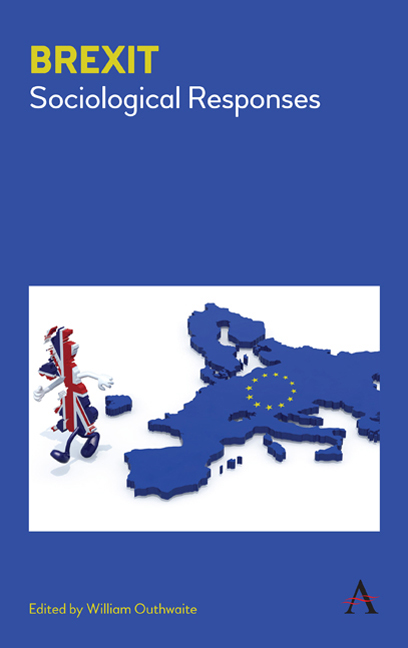Book contents
- Frontmatter
- Contents
- Preface
- Section 1 HOW DID IT HAPPEN?
- Section 2 THE POLITICS OF BREXIT
- Chapter Five Populism, Nationalism and Brexit
- Chapter Six A Tale of Two Constitutions: Whose Legitimacy? Whose Crisis?
- Chapter Seven Locating Brexit in the Pragmatics of Race, Citizenship and Empire
- Chapter Eight Globalization, Nationalism and the Changing Axes of Political Identity
- Chapter Nine A Divided Nation in a Divided Europe: Emerging Cleavages and the Crisis of European Integration
- Section 3 PROSPECTS FOR/ AFTER BREXIT
- Notes on Contributors
- Index
Chapter Seven - Locating Brexit in the Pragmatics of Race, Citizenship and Empire
from Section 2 - THE POLITICS OF BREXIT
Published online by Cambridge University Press: 10 January 2018
- Frontmatter
- Contents
- Preface
- Section 1 HOW DID IT HAPPEN?
- Section 2 THE POLITICS OF BREXIT
- Chapter Five Populism, Nationalism and Brexit
- Chapter Six A Tale of Two Constitutions: Whose Legitimacy? Whose Crisis?
- Chapter Seven Locating Brexit in the Pragmatics of Race, Citizenship and Empire
- Chapter Eight Globalization, Nationalism and the Changing Axes of Political Identity
- Chapter Nine A Divided Nation in a Divided Europe: Emerging Cleavages and the Crisis of European Integration
- Section 3 PROSPECTS FOR/ AFTER BREXIT
- Notes on Contributors
- Index
Summary
The UK referendum on continued membership of the European Union (EU), which produced a victory for the leave campaign, was less a debate on the pros and cons of membership than a proxy for discussions about race and migration, specifically, who belonged and had rights (or should have rights) and who did not (and should not). One of the key slogans of those arguing for exit from the EU was ‘we want our country back’. The racialized discourses at work here were not only present explicitly in the politics of the event but they are also implicit in much social scientific analysis. Populist political claims are mirrored by an equivalent social scientific ‘presentism’ that elides proper historical context. In this chapter, I discuss the importance of understanding Brexit in the context of a historical sociological understanding that would enable us to make better sense of the politics of the present.
Race and Class in the Brexit Debates
The last few weeks of campaigning, prior to the UK's referendum on leaving the EU, were marked by an increasingly toxic discourse on citizenship and belonging and the rights that pertain as a consequence. This discourse provided at least part of the context for the brutal killing, before the vote, of a socialist and progressive Member of Parliament (MP), Jo Cox, and was followed by increasing racist and xenophobic attacks on migrants and minorities after the decision for Brexit (see Emejulu 2016). ‘Put Britain first’ was the call that resounded not only from Batley and Spen, where Jo Cox was murdered, but also, in various degrees of intensity, from up and down and across the country. It was also mobilized in media and social scientific accounts that sought to focus attention, in particular, on the plight of a white (English) working class. As Paul Mason (2016) asked in The Guardian, ‘What happens when, instead of Poles, it is poor white English people herded into the polytunnels of Kent to pick strawberries for union- busting gangmasters?’ The prioritization of ‘poor white English people’ over presumably, poor white Poles points to an analysis of class that is deeply racialized and ethnicized and one that marked many of the debates on Brexit.
- Type
- Chapter
- Information
- BrexitSociological Responses, pp. 91 - 100Publisher: Anthem PressPrint publication year: 2017



